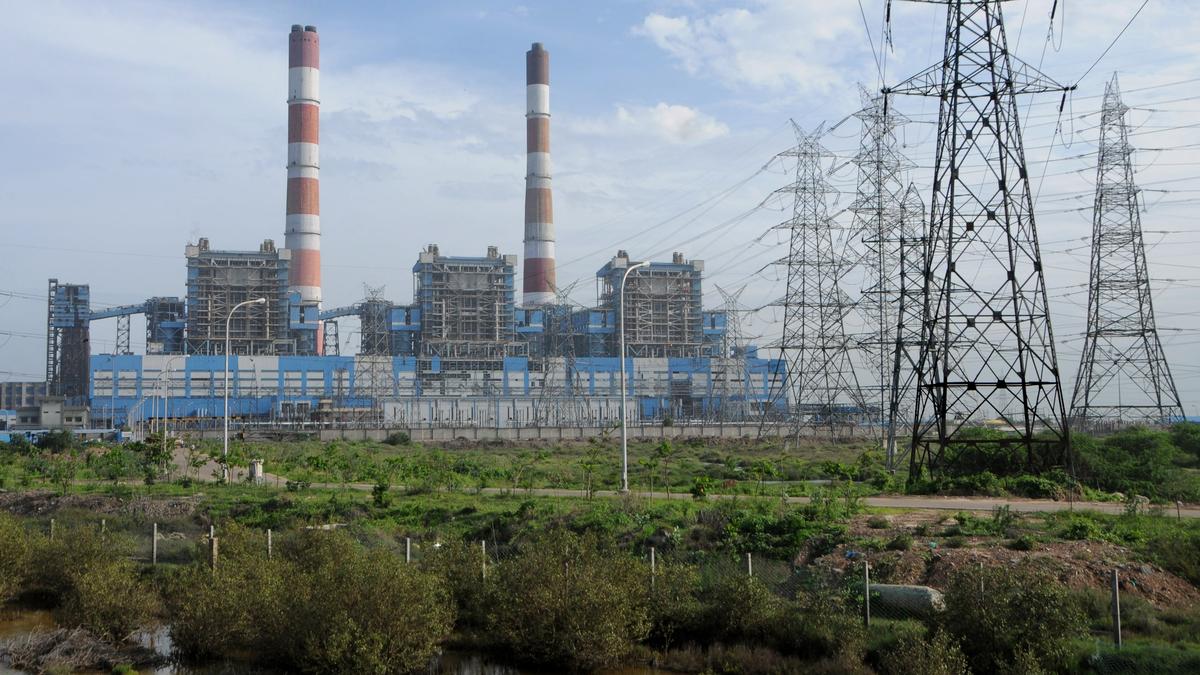File image of a power plant used only for representation.
| Photo Credit: The Hindu
The Environment Ministry has exempted the majority of India’s thermal power plants from installing flue gas desulphurisation (FGD) systems, which are designed to cut sulphur dioxide (SO2) emissions. Flue gas, a residue from thermal power plants, emits SO2, which can mix in the atmosphere and create secondary particulate matter. These are linked to air pollution.
There are about 180 thermal power plants in India. A single plant can have multiple units. Now on, only about 11% of India’s 600 thermal power plant (TPP) units have to mandatorily install FGD systems. These plants, called ‘Category A’, are the ones located within 10 km radius of the National Capital Region or are cities with a population of at least a million (2011 Census). Originally, these plants were to have put in place FGD systems by 2017 but have been given multiple extensions to comply. The latest – as per a gazette notification this week – is December 30, 2027.
Another 11% of TPPs, called Category B – located within 10 km radius of critically polluted areas (CPA) or non-attainment cities (NAC) – may or may not have to install FGD. This would depend upon a decision by a committee of experts (Expert Appraisal Committee) – an existing body constituted by the Environment Ministry that grants environment clearances to proposed coal plant projects. Category B plants that comply with the EAC norms have a deadline of December 30, 2028, to install the FGD. CPA are regions or industrial clusters that are extremely polluted and deemed so according to a specified criteria by the Central Pollution Control Board (CPCB). NAC – there are 131 of them – are those that have the worst air quality and haven’t met the National Ambient Air Quality Standards (NAAQS) for at least five years.
The remaining 78% of thermal power plants , or ‘Category C’, and are now exempt from installing FGD.
The updated rules regarding the installation of FGD are exactly in line with the recommendations of an expert committee constituted by Principal Science Adviser Ajay Sood this April. The Hindu had reported on this.

Several hurdles
Last month, Power Minister Manohar Lal Khattar said the Central Pollution Control Board was examining this committee’s recommendations and would be taking a call on the future of FGD. Only about 8% of India’s TPPs have installed FGD units. The limited number of vendors capable of installing such equipment in India, the high installation costs, the potential rise in electricity bills, and disruptions due to the COVID-19 pandemic have been some of the reasons historically cited by the Power Ministry, the overseer of India’s TPPs, for the plants’ inability to adhere to previous deadlines. In theory, the costs of non-compliance could run to crores of rupees in fines, though these have not materialised thanks to deadline extensions.
The guiding principles behind the committee’s recommendations were: SO2 levels in ambient air across the country are around 10-20 micrograms/cubic metre, well below India’s air quality norms of 80; Indian coal is low in sulphur; SO2 levels in cities near plants with operational FGD units do not differ significantly from those without these units, and all of these were anyway well below permissible levels.
The committee had said that the concerns about sulphates – a potential by-product when SO2 emissions reach certain atmospheric levels, thus forming particulate matter (PM) – are unfounded. They cited an analysis of 5,792 PM samples across the country, which found “low elemental sulphur” content (max 8 micrograms/m3 after outlier removal), which was deemed “insignificant — for considering PM removal as a benefit of FGD”.

“The CPCB and MoEFCC (Ministry of Environment, Forest and Climate Change) should have carried out a more diligent benefit cost assessment of the retrofit for SOX control. With nearly 15% of India’s ambient PM2.5 attributable to the combustion of coal, this latest notification is a short-sighted one that is not founded in the science of how and where PM2.5 forms, especially from large stacks,” Kartik Ganesan, an expert on energy and environment, at the Council on Energy, Environment and Water (CEEW), a think tank, told The Hindu.
Manoj Kumar, who has researched the FGD’s impact at the Centre for Research and Energy on Clean Air, criticised the decision. “Power plants are known to impact areas 200 kilometres away from their location. Thus, they are a source of transboundary pollution, regardless of the category they fall into. Additionally, using tall chimneys is not an effective pollution-control measure; it merely disperses sulfur dioxide higher into the atmosphere, where it eventually forms toxic fine particles. This decision will affect millions of lives in India by increasing the risk of lung and heart diseases,” he told The Hindu.
Published – July 12, 2025 10:10 pm IST
#Environment #Ministry #exempts #coal #plants #installing #key #antipolluting #systems
flue gas desulphurisation,thermal power plants,environmental issues,ministry of environment
latest news today, news today, breaking news, latest news today, english news, internet news, top news, oxbig, oxbig news, oxbig news network, oxbig news today, news by oxbig, oxbig media, oxbig network, oxbig news media
HINDI NEWS
News Source


